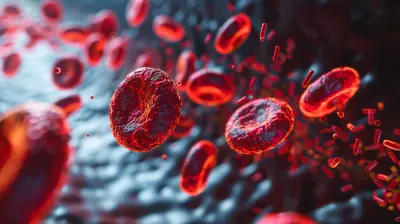29 November 2024
When it comes to keeping your heart healthy and strong, you've likely heard about the usual suspects: exercise, a balanced diet, and maybe even reducing stress. But did you know there’s a tiny, powerhouse nutrient working behind the scenes to keep your heart beating like a well-tuned engine? Cue CoQ10, the unsung hero of cellular energy production and cardiovascular health.
If you’re scratching your head wondering what CoQ10 is or why it’s essential, don’t worry. By the end of this article, you’ll be ready to join the CoQ10 fan club. Let’s dive into the world of this cellular energizer and uncover why your heart might just thank you for giving it a little extra love. 
What is CoQ10?
Alright, let’s start with the basics. CoQ10, short for coenzyme Q10, is a vitamin-like compound that’s found in every single cell of your body. Yes, every single one! Think of it as a microscopic battery charger for your cells. It helps generate energy in the mitochondria (aka the powerhouse of the cell). Without it, your cells would pretty much be like a smartphone with a dead battery—completely useless.CoQ10 is naturally produced by your body, but here’s the catch: as you age, your production of it starts to decline. And if you’re over 40, your levels might already be taking a nosedive. On top of that, certain health conditions and medications (like statins) can deplete your CoQ10 levels even further. 
CoQ10 and Heart Health: A Symbiotic Relationship
So, what’s the deal with CoQ10 and your heart? Why is this little molecule so important for cardiovascular health? Let’s break it down.1. Energy for Your Heart
Your heart is, quite literally, the hardest-working muscle in your body. It pumps blood non-stop, 24/7, to keep you alive. That takes a whole lot of energy! And guess what? CoQ10 plays a starring role in making sure your heart cells have the energy they need to function properly.When CoQ10 levels are low, it’s like trying to run a marathon without enough fuel—you’re going to sputter out. Research has shown that people with heart failure and other cardiovascular conditions often have lower levels of CoQ10. This connection makes sense when you consider how energy-intensive the heart’s job is.
2. Antioxidant Protection
If energy production is CoQ10’s day job, its side hustle is acting as a powerful antioxidant. Antioxidants, in case you didn’t know, are like the body’s own cleanup crew. They fight off harmful molecules called free radicals that can damage your cells.Think about your heart as a car engine. Over time, wear and tear from friction (or in this case, free radicals) can lead to rust and breakdowns. CoQ10 helps keep your engine running smoothly by neutralizing those pesky free radicals and reducing oxidative stress in your heart cells.
3. Supports Healthy Blood Pressure
Is your blood pressure creeping into the danger zone? CoQ10 might help bring it back into check. Studies have suggested that CoQ10 supplementation can have a mild blood-pressure-lowering effect. While it’s not a magic cure for hypertension, it’s certainly a tool worth considering in your heart health toolkit.4. Cholesterol and Lipid Health
If you’re taking statins to manage cholesterol, here’s something you need to know: statins can significantly reduce your body’s CoQ10 levels. This is because statins block the same pathway your body uses to produce CoQ10.The result? Muscle pain, fatigue, and potentially even more stress on your heart. Supplementing with CoQ10 may help counteract these side effects, letting you focus on keeping your cholesterol in check without sacrificing your overall well-being. 
Signs You Might Be Low on CoQ10
So, how do you know if your CoQ10 levels need a boost? While it’s hard to pinpoint without medical testing, here are some common signs that might suggest your levels are running low:- Fatigue and low energy: Feeling like you’re dragging through the day? Your cells might be struggling to produce enough energy.
- Muscle weakness or cramps: Since CoQ10 supports muscle function, a deficiency can lead to problems in this department.
- Brain fog: Remember, your brain needs energy to function too. Low CoQ10 levels can leave you feeling mentally sluggish.
- Heart-related symptoms: If you’re dealing with high blood pressure, heart failure, or other cardiovascular issues, low CoQ10 could be a contributing factor. 
How to Boost Your CoQ10 Levels
The good news? You can replenish your CoQ10 reserves! Here’s how:1. Eat CoQ10-Rich Foods
Your diet is a great place to start. Foods high in CoQ10 include:- Fatty fish like salmon, tuna, and mackerel
- Organ meats such as liver and kidney (not everyone’s cup of tea, but worth a mention)
- Nuts and seeds, particularly peanuts and pistachios
- Vegetable oils like soybean and canola oil
While these foods can help, it’s important to note that the amount of CoQ10 you get from your diet may not be enough, especially if you’re dealing with a deficiency.
2. Consider Supplementation
Sometimes, a supplement is the easiest and most effective way to boost your CoQ10 levels. CoQ10 supplements come in two forms:- Ubiquinone: The oxidized form, which must be converted into ubiquinol in the body.
- Ubiquinol: The active form, which is easier for your body to use directly.
For most people, ubiquinol is the better option, especially if you’re older or dealing with a condition that affects CoQ10 absorption. Consult with your healthcare provider to determine the right dosage for you.
3. Make Lifestyle Adjustments
While CoQ10 is a super nutrient, it’s not a magic wand. Pair it with heart-healthy habits like regular exercise, a balanced diet, and stress management to give your cardiovascular system the best possible support.Are There Any Side Effects?
Like any supplement, CoQ10 isn’t completely risk-free. The good news is that it’s generally well-tolerated by most people. However, some might experience mild side effects such as:- Upset stomach
- Nausea
- Headaches
To minimize any potential issues, start with a lower dose and gradually work your way up. And, of course, always talk to your doctor before starting any new supplement.
The Bottom Line: Is CoQ10 Right for You?
If your heart could send you a thank-you note, CoQ10 might just top the list of reasons why. From fueling your heart cells with energy to protecting them from damage, CoQ10 is like a personal trainer and a mechanic rolled into one for your cardiovascular health.Whether you’re looking to support your heart as you age, manage an existing condition, or simply feel more energized, CoQ10 could be worth exploring. And hey, who doesn’t want their heart running like a well-oiled machine?
Remember, though: supplements are just one piece of the puzzle. Combine CoQ10 with heart-smart habits for the best results. Your heart (and the rest of your body) will thank you for it!










Dean Reynolds
CoQ10's role in heart health highlights its potential for enhancing cellular energy.
February 6, 2025 at 5:28 AM